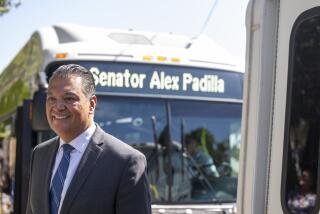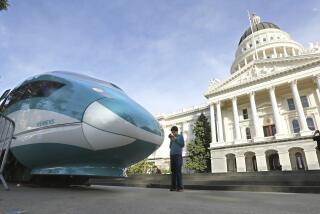Santa Claus Is an Incumbent, States Find as Bush Dips Into His Federal Goody Bag : Politics: The President brings a shower of government gifts in his swing through the South and Midwest.
WASHINGTON — As President Bush campaigns in primary states these days, Air Force One is doing double duty as Santa’s sleigh and eight reindeer.
Even as he condemns Congress for playing pork-barrel politics, Bush is delivering governmental goodies to the South and Midwest in the form of jobs, grants or beneficial federal regulations.
This week, it’s expected to be Michigan’s turn. Assuming the Administration holds to its schedule, when Bush visits the state Friday to campaign for the March 17 primary he will unveil a plan to encourage Americans to turn in their old smoke-belching cars. That would set off a round of trading in and trading up that would eventually benefit Detroit’s struggling auto industry.
Similarly, when he was in Mississippi last week, Bush told a friendly throng at the state Capitol in Jackson that he had picked a local man for a senior job in Washington. “I will nominate Jim Huff of Taylorsville to join my Administration,” Bush said, gaining a round of applause. (James B. Huff Sr., a U.S. Agriculture Department official in Mississippi, will become administrator of the Rural Electrification Administration.)
And last month, while visiting Los Angeles, Bush issued a plan to clean up pollution along the border with Mexico. Most of the U.S.-Mexico agreement had been announced before, but the President used his California visit to highlight it.
This largess is nothing new in politics. Back in 1948, when Sen. Robert Taft (R-Ohio) was running for the Republican nomination, President Harry S. Truman raised farm subsidies in an election year to assure a healthy economic outlook for voting farmers. Taft was said to be outraged. (In the end, Taft lost the nomination to New York Gov. Thomas E. Dewey, who, in turn, lost the general election to Truman.) The presents in George Bush’s pack may be different this year, but the intent is the same: to allow the incumbent President to take credit for Administration actions that will be felt on the voters’ level, and to shine a presidential spotlight on some of the nitty-gritty activities often taking place in the dark maze of government agencies.
“I couldn’t convince you in 1,000 years this has nothing to do with the President’s running for reelection,” a White House official said on condition of anonymity. “That is part of it.”
But, he added, “These are things that would take place no matter what. Some are political in nature and have been expedited because we’re going into a particular state. Others would be announced by a Cabinet member, and we’re taking credit for things we should be taking credit for. We’ll elevate to the President’s level announcements that have been getting lost out there.”
In the last week alone, in addition to Huff’s nomination, Bush announced:
* A lifting of certain regulatory barriers to development of the natural gas industry, while he was in Oklahoma.
* An agreement with the state of Florida over restoration of the Kissimmee River basin, a 29,000-acre wetlands project, while on a campaign visit to Miami.
* The signing of a National Day of Prayer proclamation, two months in advance, while touring the Bible Belt, which figured heavily in Tuesday’s voting.
This Friday, during his trip to Michigan, Bush is expected to draw attention to a plan to encourage states or private industries to pay bounties to get old polluting vehicles off the road. It would be modeled after a program run by Unocal Corp. nearly two years ago in Los Angeles, when the oil company paid $700 for 7,000 pre-1971 cars turned in to it.
At the heart of Bush’s plan, as currently drawn, would be a system of trades: Private companies emitting air pollutants beyond a prescribed limit would be able to continue the practice if other sources of pollution--in this case, the old cars--were removed at the companies’ expense.
Details of the proposal are still being worked out. But the bounty is expected to be somewhere between $700 and $1,000 per vehicle. The plan is authorized by the Clean Air Act, which cites cars produced in 1980 or before. But Bush’s plan could require that the vehicles be even older than that.
The plan, part of a larger effort to help the auto industry, presumably would encourage drivers to trade their old polluting cars for newer, less polluting ones, thus improving the overall performance of the “fleet” on the road--and the auto companies’ sales.
But whether the distribution of such government assistance really changes any votes is a matter of debate. “It’s not relevant. It doesn’t make any difference,” one longtime Democratic operative said.
In this primary season, he said, conservative voters seeking to send a message to Bush by voting for Patrick J. Buchanan would be unimpressed--if not downright angered--by a freehanded giveaway of tax-funded projects.
And, he said, the political Establishment, which might be swayed by such generosity, is already in Bush’s camp.
“That’s the kind of thing you do when you’re trying to corral the political Establishment,” he said. “The mayor gets credit. The congressman gets credit. The senator gets credit. But Bush has the political Establishment.”
But a White House official said the practice “can be defended as a legitimate part of the political process, although the timing is a little awkward.”
“If you do things that are politically popular, that’s what you’re supposed to do,” he said. “That’s what you’re in office for.”
More to Read
Get the L.A. Times Politics newsletter
Deeply reported insights into legislation, politics and policy from Sacramento, Washington and beyond. In your inbox three times per week.
You may occasionally receive promotional content from the Los Angeles Times.










